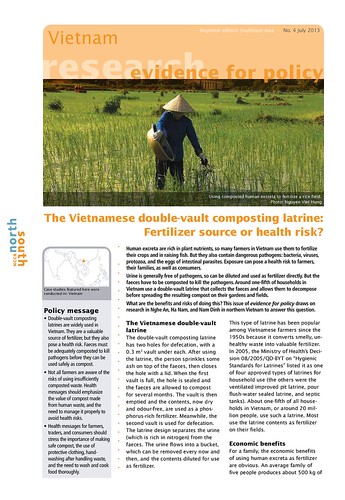TRUNG TÂM NGHIÊN CỨU Y TẾ CÔNG CỘNG VÀ HỆ SINH THÁI
CENTER FOR PUBLIC HEALTH AND ECOSYSTEM RESEARCH
CENPHER

Human excreta are rich in plant nutrients, so many farmers in Vietnam use them to fertilize their crops and in raising fish. But they also contain dangerous pathogens: bacteria, viruses, protozoa, and the eggs of intestinal parasites. Exposure can pose a health risk to farmers, their families, as well as consumers.
Urine is generally free of pathogens, so can be diluted and used as fertilizer directly. But the faeces have to be composted to kill the pathogens. Around one-fifth of households in Vietnam use a double-vault latrine that collects the faeces and allows them to decompose before spreading the resulting compost on their gardens and fields.
What are the benefits and risks of doing this? This issue of evidence for policy draws on research in Nghe An, Ha Nam and Nam Dinh in northern Vietnam to answer this question.

Cover page of the policy brief
To download this version, please visit the website of NCCR at http://www.north-south.unibe.ch/content.php/page/id/328 or directly download the issue here